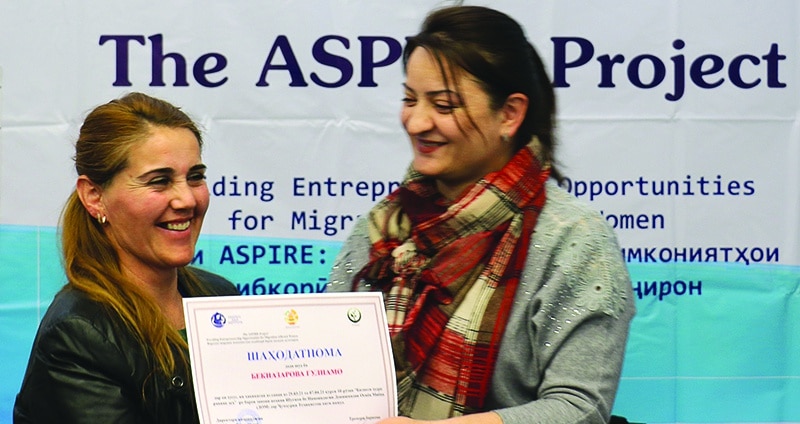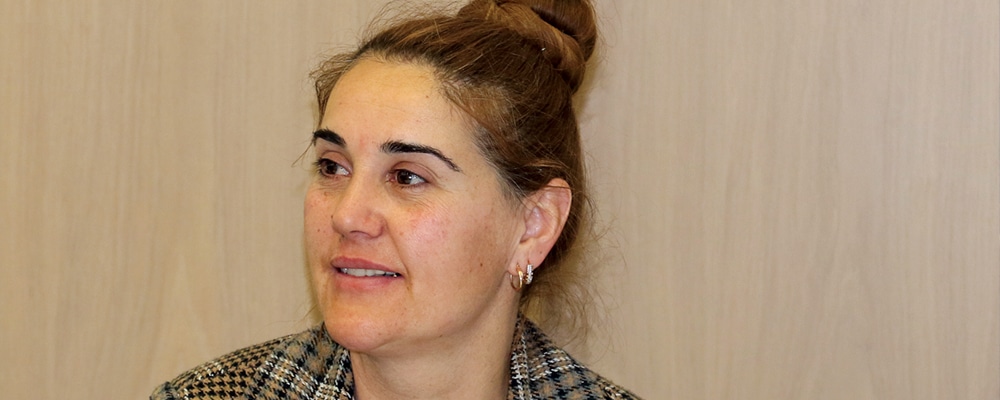Differently abled craftswoman turns her passion into a profession
By Hannah Denys
Now Gulnamo is 42, and she creates elaborate, richly colored handicrafts—from traditional Pamiri socks to ornately beaded jewelry to whimsical souvenirs. Making these beautiful treasures has become her passion. She’ll find any excuse—a friend’s wedding, a family member’s birthday, or just a quiet moment—to sit and practice her art. And by doing so, Gulnamo is keeping a longstanding family tradition alive.
Women in Gulnamo’s family have been knitting and crafting for many decades, passing down the traditional knowledge and skills from mother to daughter for generations. Gulnamo’s mother, Gulkhotun, knit professionally when she was younger, working at a weaving factory in eastern Tajikistan. There she made just 50 somonis (about $5) a month. She loved the work, but said the salary “was nothing to survive on.” She wanted more for her daughter, so she encouraged her to get a college degree and pursue a career outside of crafting.
Even though Gulnamo wanted to pursue her passion for crafting, she applied to university and was accepted. With the money she earned from selling her handmade products she was able to pay her university fees. Yet, even after graduating from university, she continued spinning wool, knitting socks, and making souvenirs, often giving them to friends as gifts. Crafting would have to remain a hobby for Gulnamo, who’d given up hope that she could turn her passion into a sustainable career.
Then Gulkhotun heard about a business training workshop for women. Here was an opportunity for her daughter to both pursue her passion and make a good living.
Women like Gulnamo who live in small, mountain villages in Tajikistan almost never have an opportunity to take part in courses about starting and running a small business, despite their need for such knowledge and skills. Because of the limited jobs available in Tajikistan, people are often forced to leave the country to find work. Most go to China or Russia and send money home to their families. Reports estimate that 30% of the population of eastern Tajikistan, where Gulnamo lives, works abroad. Unfortunately, sometimes men working abroad decide to build a new life for themselves in their adoptive country, and the money they had been sending home to their families dries up. Women and children are left to fend for themselves.
For these single-parent households, it’s crucial for women to earn an income. Even for Tajik couples who stay together, a second income can help lift a family out of poverty, which is sorely needed in a country where one-third of the population lives in poverty.
During the 10-day workshop, Gulnamo and the other 118 female participants learned how to create business plans and budgets, analyze and respond to market demands, and perform basic accounting functions. They were connected to local women’s business associations, introduced to potential mentors, and shown how to apply for financing.
“This training totally changed my life,” Gulnamo says. “In the training, I learned about how to make and save money.”
“I learned how to plan my family budget, daily calculation of money and income, managing money, and saving money. The training changed my life. Within a month, I managed to hire two more ladies who work with me and are able to improve their life. Besides that, I am teaching sewing skills and sharing knowledge with the ladies to make them successful like me as a businesswoman in the village. My plan is to open my own sewing workshop and involve more housewives.”
– Fakhriya Dovutova, business program graduate
But it’s not just program participants who are benefiting from the training. Program graduates are determined to help other women and families benefit from what they’ve learned. Several of them have formed a network for female entrepreneurs that will allow members to share knowledge and pool resources. They’re even raising funds for a micro-finance program, which will help other prospective entrepreneurs pay for trainings and start companies.
Gulnamo is also planning to use what she’s learned to help other craftswomen in her community. “After saving money, I’ll start constructing a souvenir shop in my village to sell handmade crafts together with other girls,” she explains. “I’ll teach my skills of knitting, making rabbits, and other things to young girls in my village—my neighbors and nieces. Some of the young girls are already skillful in making Pamiri skull caps, socks, national dresses, and more. I want to sell all the products in the shop. A lot of tourists come through our village. They walk on the road and buy different things. This is my wish and hope for the future.”

In two years, Central Asia Institute Tajikistan has trained 170 would-be female entrepreneurs. Many of them have gone on to start successful businesses. But there are many more women waiting in the wings, eager to participate in the program. They already have the vision and the passion. They just need a little bit of help to
get started.
To meet this need, Central Asia Institute Tajikistan staff hope to offer the business training course annually. In addition, they have plans to expand the program to provide financial support and ongoing mentorship to workshop graduates.
Using what they’ve learned from this workshop, women are taking their financial futures into their own hands and working to pull their families out of poverty. At the same time, they’re preserving age-old artforms and building a strong community of female business owners in one of the most remote regions of the world. As the program continues to grow and expand to reach more women, the possibilities are endless. Women can do amazing things when they turn their passions into professions.
Special thanks to the U.S. Embassy in Tajikistan for funding the 2020 pilot program.
“[Following the training], I decided to take a risk and bravely started to bake kulcha (little round loaves of bread) and took them to a small shop for selling. With the money I bought flour again, and this way increased my income. I started to save money for my children’s needs, as we learned in the training. I have a garden and orchard, but before I felt ashamed and afraid to sell the products. But the training changed my mind. I feel a great improvement in my life. I am sharing the training information with my children, who help me in making kulcha. I am planning to get a better oven to make quality kulcha, as there is big demand. Neighbors and friends order kulcha for weddings and other events.”
– Zarniso Alidodova, business program graduate






